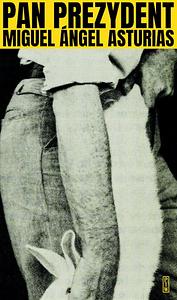Take a photo of a barcode or cover
dark
reflective
sad
slow-paced
Plot or Character Driven:
Plot
Strong character development:
No
Loveable characters:
No
Diverse cast of characters:
No
Flaws of characters a main focus:
No
dark
tense
medium-paced
Plot or Character Driven:
Plot
Strong character development:
No
Loveable characters:
No
Diverse cast of characters:
Yes
Flaws of characters a main focus:
Yes
challenging
dark
emotional
funny
informative
reflective
sad
tense
slow-paced
Miguel Angel Asturias' novel "Mr. President" is a classic but often overlooked novel. It is a darkly prescient satire of life under brutal dictatorship. The novel is set in an unnamed Latin American country and tells the story of a ruthless dictator who rules over his people with an iron fist. The novel is considered one of the most important works of Latin American literature and is widely regarded as a masterpiece.
David Unger's translation of "Mr. President" is masterful and makes this work accessible to English readers. Unger has done an excellent job in capturing the essence of Asturias' writing style and has managed to convey the humor and satire in the book without losing its depth and meaning.
"Mr. President" is an important work in the history of Latin American strong-man novels. It was written during a time when many Latin American countries were ruled by dictators and strongmen. The novel is a powerful critique of authoritarianism and remains relevant today.
David Unger's translation of "Mr. President" is masterful and makes this work accessible to English readers. Unger has done an excellent job in capturing the essence of Asturias' writing style and has managed to convey the humor and satire in the book without losing its depth and meaning.
"Mr. President" is an important work in the history of Latin American strong-man novels. It was written during a time when many Latin American countries were ruled by dictators and strongmen. The novel is a powerful critique of authoritarianism and remains relevant today.
dark
informative
mysterious
tense
slow-paced
Plot or Character Driven:
A mix
Strong character development:
Yes
Loveable characters:
No
Diverse cast of characters:
Yes
Flaws of characters a main focus:
Yes
dark
emotional
reflective
sad
tense
medium-paced
Plot or Character Driven:
Plot
Strong character development:
Complicated
Loveable characters:
Complicated
Diverse cast of characters:
Yes
Flaws of characters a main focus:
N/A
challenging
dark
reflective
medium-paced
Plot or Character Driven:
A mix
Strong character development:
Complicated
Loveable characters:
No
Diverse cast of characters:
Yes
Flaws of characters a main focus:
Complicated
Love that the narrator has a Guatemalan accent! There's also a very clearly poetic rhythm/ pentameter in certain parts.
I’m sure there are a lot of things in this book that went over my head. I definitely want to reread it in English and then read the text version again in Spanish since this time, I listen to the audiobook in Spanish. I think that will help me grasp a lot more of the underlying concepts and things that I just didn’t catch this time. But overall, I really did enjoy it. It was very disconcerting the grasp that the president had on his “team” and their need to please him.
There are so many phrases in this book that I grew up hearing (Guatemalan family) and it makes me wonder if they have always been colloquial phrases or if they originated from this book. (Como no chon; requtecontra; a puchica voz)
“Los médicos pueden ensayar en el hospital con los indios.”
“Un tonto, un loco, y un niño no habrían concertado tan absurdo plan.”
adventurous
challenging
dark
emotional
informative
reflective
sad
tense
medium-paced
Plot or Character Driven:
A mix
Strong character development:
Yes
Loveable characters:
Complicated
Diverse cast of characters:
Yes
Flaws of characters a main focus:
No
Miguel Ángel Asturias garnered plenty of credit for innovation with his 1933 novel “The President”. The work is deemed to have influenced the celebrated magic realist movement in Latin American literature, as well as establishing the dictator novel genre. The praise for these achievements is noteworthy, yet the literary merit of “The President” still deserves scrutiny.
The novel tells the story of the citizens of a republic that live under dictatorship. From the initial pages we are under no illusion that truth is manufactured to the tastes of the ruler, and that the fate of each individual is fully dependent on his will. The President’s position, though secure, is maintained by his fear against his opponents. Their purging becomes the rule of law. The several vignettes, involving a plethora of characters from diverse social classes, inform the reader that death is the saviour to pain and injustice.
Asturias was not subtle in “The President”. The persistent cycle of terror runs like a dogmatic prayer throughout the course of the novel. The author’s desire to prove the horrors of dictatorship often runs at the expense of character development. Angel Face, the President’s confidant, is the best example in how Asturias placed action and meaning over the fate of the character. The transitions from friend to enemy, from ignorance to love, from hope to despair, are not experienced but simply narrated. As a result, the connection to the fate of the individual is distanced from the reader, and with it, the understanding of tragedy.
The magnitude of scope to cover as much injustice as possible leads to the additional dilution of tension. Just as we start engaging with one story, the author moves our attention to another, and when we finally return to it, the sense of foreboding or grief vanishes. The sequence of chapters is the main culprit for this effect, whilst simultaneously Asturias must be commended for experimenting with the form.
“The President” is a significant novel in its role in the history of literature for its themes and style. The mingling of dream and reality create spell-binding moments in which the author sings with an innovative voice, in spite of the fact that these episodes feel slightly forced in the narrative. This is not a literary masterpiece, nor a page-turning experience. It is an experiment that deserves to be read, but one that would attract less passion from the reader.
The novel tells the story of the citizens of a republic that live under dictatorship. From the initial pages we are under no illusion that truth is manufactured to the tastes of the ruler, and that the fate of each individual is fully dependent on his will. The President’s position, though secure, is maintained by his fear against his opponents. Their purging becomes the rule of law. The several vignettes, involving a plethora of characters from diverse social classes, inform the reader that death is the saviour to pain and injustice.
Asturias was not subtle in “The President”. The persistent cycle of terror runs like a dogmatic prayer throughout the course of the novel. The author’s desire to prove the horrors of dictatorship often runs at the expense of character development. Angel Face, the President’s confidant, is the best example in how Asturias placed action and meaning over the fate of the character. The transitions from friend to enemy, from ignorance to love, from hope to despair, are not experienced but simply narrated. As a result, the connection to the fate of the individual is distanced from the reader, and with it, the understanding of tragedy.
The magnitude of scope to cover as much injustice as possible leads to the additional dilution of tension. Just as we start engaging with one story, the author moves our attention to another, and when we finally return to it, the sense of foreboding or grief vanishes. The sequence of chapters is the main culprit for this effect, whilst simultaneously Asturias must be commended for experimenting with the form.
“The President” is a significant novel in its role in the history of literature for its themes and style. The mingling of dream and reality create spell-binding moments in which the author sings with an innovative voice, in spite of the fact that these episodes feel slightly forced in the narrative. This is not a literary masterpiece, nor a page-turning experience. It is an experiment that deserves to be read, but one that would attract less passion from the reader.
challenging
dark
sad
slow-paced
Plot or Character Driven:
A mix
Strong character development:
Complicated
Loveable characters:
No
Diverse cast of characters:
Complicated
Flaws of characters a main focus:
Yes
Wasn’t keeping my attention anymore. Didn’t care for the characters





